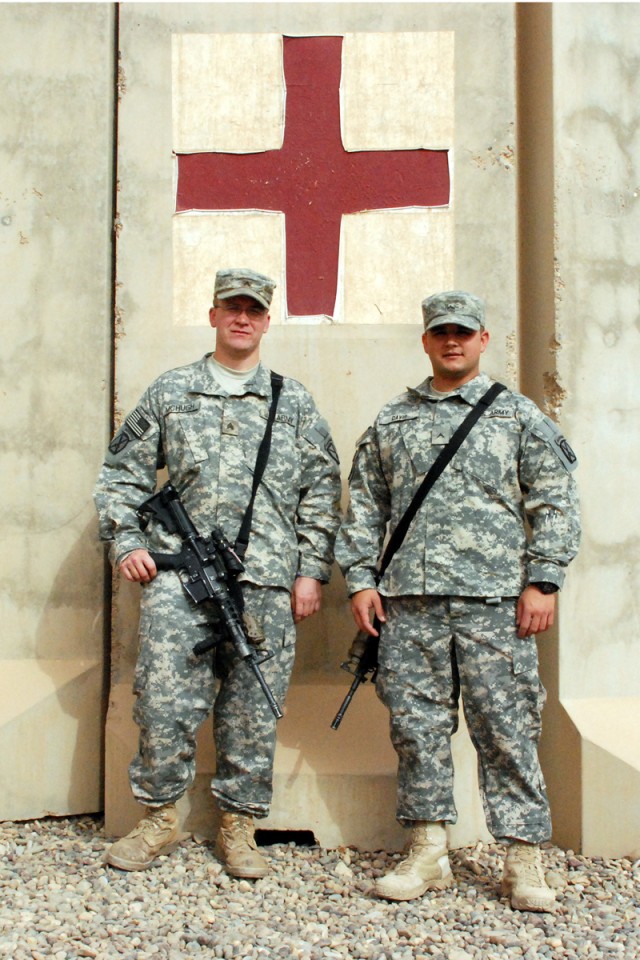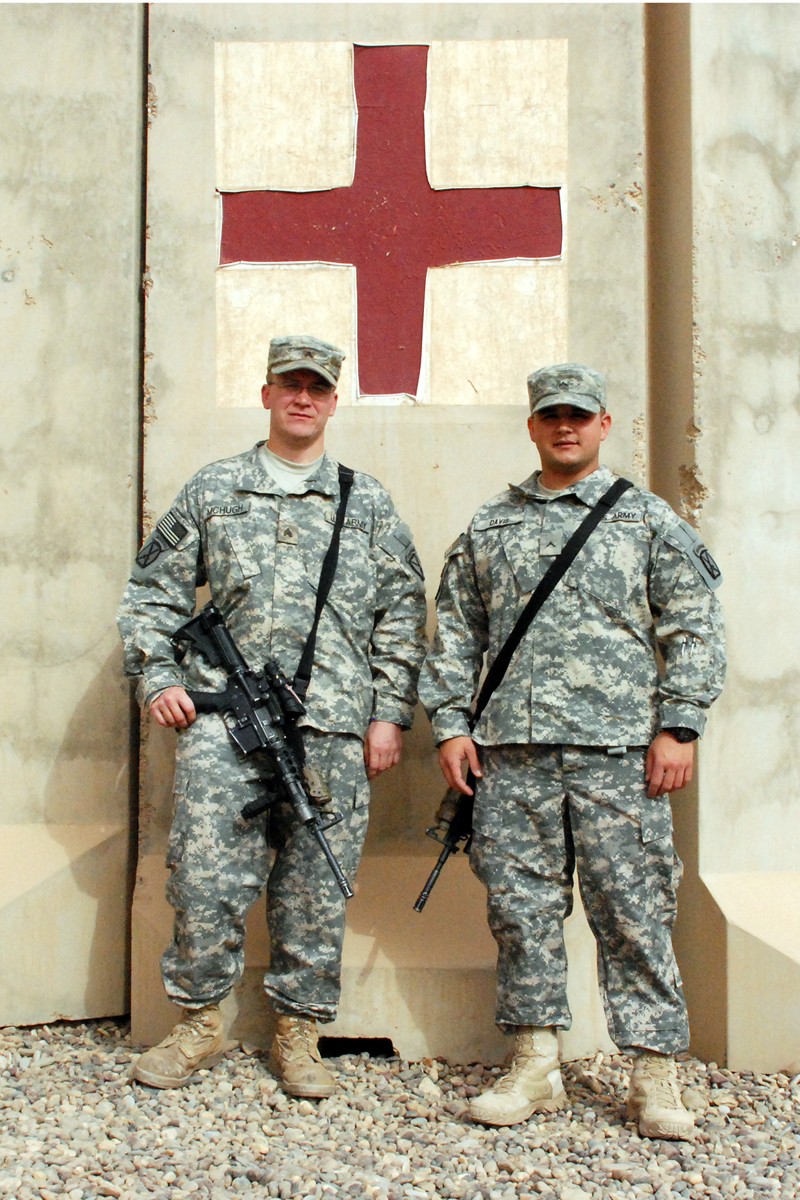
FORWARD OPERATING BASE WARHORSE, Iraq - Two medics from the 2nd Battalion, 10th Combat Aviation Brigade saved the life of a man believed to be an insurgent March 19 while conducting sensitive-site exploitation operations east of Baghdad.
Sgt. Corey McHugh and Pvt. Michael Davis, both medics with the Fox Company Pathfinders, applied their emergency life-saving skills to an injured man they found in the rubble of an earlier air strike.
"He was at the bottom of a bunker, surrounded by two guys who were killed in action," McHugh explained. "At first, we weren't even sure he was alive; then we saw he was breathing. The team cleared the area and made sure he wasn't a threat to us, then Davis and I treated him."
Once they established that the casualty was able to breathe and talk, Davis said they used their interpreter to get the man to tell them where he was wounded.
"He kept saying his back hurt," Davis said, "and when we stripped his top off we found that he had shrapnel wounds all up his back."
Upon evaluating him, the medics discovered that the man had open wounds on his back and side, and was suffering from dehydration.
"We put chest seals on him, monitored his airway and made sure he kept talking to us," Davis explained. "He'd been out there for a while and had lost a lot of blood. He could have been there anywhere from six to 14 hours, depending on whether he was injured in a raid that morning or the night before."
After both medics treated his wounds and made sure the man was stable, McHugh accompanied the casualty on the helicopter as he was air-evacuated to the Combat Support Hospital in Joint Base Balad.
Although neither Soldier knows what happened to their patient after they delivered him to Balad, they are confident he was in good hands.
"His vitals were stable when we dropped him off, and I got to watch the medical staff start their treatment there," McHugh said. "Given what he had gone through, he seemed to be in pretty good shape."
According to the Law of War, U.S. military personnel are obligated to collect and care for enemy dead and wounded. Article 15 of the first Geneva Convention states that "at all times, and particularly after an engagement, Parties to the conflict shall, without delay, take all possible measures to search for and collect the wounded and sick, to protect them against pillage and ill-treatment, [and] to ensure their adequate care..."
Neither Soldier had any reservations about treating the suspected enemy wounded.
Besides being the right thing to do, Davis said, "I didn't have a problem helping him, because the chances for treating a live casualty are so rare that I wanted the hands-on experience."
"It helped prepare me for the next time, when it could be one of our guys," he added.
Plus, McHugh added, "we figured since he is most likely an enemy combatant, someone might be able to get some intelligence from him that we can use in the future."
The medics said the man had no issue being helped by U.S. Soldiers, and offered no resistance during treatment.
"He was really thankful," McHugh said. "On the bird, he kept saying 'thank you mister, thank you mister' over and over again. When we got to Balad and the medical personnel there started taking over, he reached out for me like he wanted me to stay with him - like he thought I was going to protect him."
This was the first time either Soldier had treated a live casualty in combat; but, McHugh said, "we weren't nervous at all - we were pretty confident."
Davis attributes his confidence to knowing that the rest of his Pathfinder team was keeping watch, and to all the training they had done for missions exactly like this one.
"I felt like we were safe," he explained. "We had sufficient air support and plenty of guys around that we had been training with since day one - and it pretty much went exactly like training.
"We've run these scenarios so much in the Pathfinder Company - I've done more casualty assessments in this unit than I had the entire year I was a medic before coming here," Davis said. "We're out here running crash scenarios and live-shoot scenarios where we have casualties every time - it was exactly like that when we were out there."
"Everything we do [during training] is pretty much a stress shoot," McHugh agreed, adding that medics going through advanced individual training would benefit from training in the same types of scenarios.
Staff Sgt. Lazaro Perez, a 1st Platoon squad leader, said McHugh and Davis' performance reinforced the rest of the team's trust in their medics.
"We were already confident in them and knew they could do their jobs; but it was good to see them put it into action, especially under the time constraints they were given," Perez said. "They both did an amazing job. It's reassuring."

Social Sharing